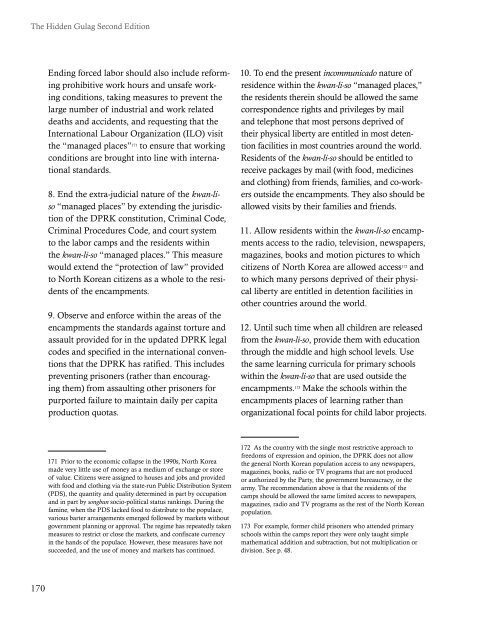The Hidden Gulag - US Committee for Human Rights in North Korea
The Hidden Gulag - US Committee for Human Rights in North Korea
The Hidden Gulag - US Committee for Human Rights in North Korea
You also want an ePaper? Increase the reach of your titles
YUMPU automatically turns print PDFs into web optimized ePapers that Google loves.
<strong>The</strong> <strong>Hidden</strong> <strong>Gulag</strong> Second EditionEnd<strong>in</strong>g <strong>for</strong>ced labor should also <strong>in</strong>clude re<strong>for</strong>m<strong>in</strong>gprohibitive work hours and unsafe work<strong>in</strong>gconditions, tak<strong>in</strong>g measures to prevent thelarge number of <strong>in</strong>dustrial and work relateddeaths and accidents, and request<strong>in</strong>g that theInternational Labour Organization (ILO) visitthe “managed places” 171 to ensure that work<strong>in</strong>gconditions are brought <strong>in</strong>to l<strong>in</strong>e with <strong>in</strong>ternationalstandards.8. End the extra-judicial nature of the kwan-liso“managed places” by extend<strong>in</strong>g the jurisdictionof the DPRK constitution, Crim<strong>in</strong>al Code,Crim<strong>in</strong>al Procedures Code, and court systemto the labor camps and the residents with<strong>in</strong>the kwan-li-so “managed places.” This measurewould extend the “protection of law” providedto <strong>North</strong> <strong>Korea</strong>n citizens as a whole to the residentsof the encampments.9. Observe and en<strong>for</strong>ce with<strong>in</strong> the areas of theencampments the standards aga<strong>in</strong>st torture andassault provided <strong>for</strong> <strong>in</strong> the updated DPRK legalcodes and specified <strong>in</strong> the <strong>in</strong>ternational conventionsthat the DPRK has ratified. This <strong>in</strong>cludesprevent<strong>in</strong>g prisoners (rather than encourag<strong>in</strong>gthem) from assault<strong>in</strong>g other prisoners <strong>for</strong>purported failure to ma<strong>in</strong>ta<strong>in</strong> daily per capitaproduction quotas.10. To end the present <strong>in</strong>communicado nature ofresidence with<strong>in</strong> the kwan-li-so “managed places,”the residents there<strong>in</strong> should be allowed the samecorrespondence rights and privileges by mailand telephone that most persons deprived oftheir physical liberty are entitled <strong>in</strong> most detentionfacilities <strong>in</strong> most countries around the world.Residents of the kwan-li-so should be entitled toreceive packages by mail (with food, medic<strong>in</strong>esand cloth<strong>in</strong>g) from friends, families, and co-workersoutside the encampments. <strong>The</strong>y also should beallowed visits by their families and friends.11. Allow residents with<strong>in</strong> the kwan-li-so encampmentsaccess to the radio, television, newspapers,magaz<strong>in</strong>es, books and motion pictures to whichcitizens of <strong>North</strong> <strong>Korea</strong> are allowed access 172 andto which many persons deprived of their physicalliberty are entitled <strong>in</strong> detention facilities <strong>in</strong>other countries around the world.12. Until such time when all children are releasedfrom the kwan-li-so, provide them with educationthrough the middle and high school levels. Usethe same learn<strong>in</strong>g curricula <strong>for</strong> primary schoolswith<strong>in</strong> the kwan-li-so that are used outside theencampments. 173 Make the schools with<strong>in</strong> theencampments places of learn<strong>in</strong>g rather thanorganizational focal po<strong>in</strong>ts <strong>for</strong> child labor projects.171 Prior to the economic collapse <strong>in</strong> the 1990s, <strong>North</strong> <strong>Korea</strong>made very little use of money as a medium of exchange or storeof value. Citizens were assigned to houses and jobs and providedwith food and cloth<strong>in</strong>g via the state-run Public Distribution System(PDS), the quantity and quality determ<strong>in</strong>ed <strong>in</strong> part by occupationand <strong>in</strong> part by songbun socio-political status rank<strong>in</strong>gs. Dur<strong>in</strong>g thefam<strong>in</strong>e, when the PDS lacked food to distribute to the populace,various barter arrangements emerged followed by markets withoutgovernment plann<strong>in</strong>g or approval. <strong>The</strong> regime has repeatedly takenmeasures to restrict or close the markets, and confiscate currency<strong>in</strong> the hands of the populace. However, these measures have notsucceeded, and the use of money and markets has cont<strong>in</strong>ued.172 As the country with the s<strong>in</strong>gle most restrictive approach tofreedoms of expression and op<strong>in</strong>ion, the DPRK does not allowthe general <strong>North</strong> <strong>Korea</strong>n population access to any newspapers,magaz<strong>in</strong>es, books, radio or TV programs that are not producedor authorized by the Party, the government bureaucracy, or thearmy. <strong>The</strong> recommendation above is that the residents of thecamps should be allowed the same limited access to newspapers,magaz<strong>in</strong>es, radio and TV programs as the rest of the <strong>North</strong> <strong>Korea</strong>npopulation.173 For example, <strong>for</strong>mer child prisoners who attended primaryschools with<strong>in</strong> the camps report they were only taught simplemathematical addition and subtraction, but not multiplication ordivision. See p. 48.170



